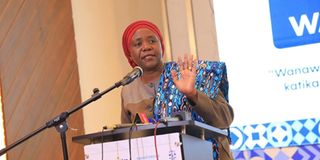Minister says empowering women in leadership will not weaken marriage

Minister of Community Development, Gender, Women, and Special Needs, Dr Dorothy Gwajima speaks during the launch of the ‘USAID Wanawake Sasa’ project in Dar es Salaam on September 19, 2024. PHOTO | COURTESY
What you need to know:
- Dr Gwajima further highlighted that achieving gender equality doesn’t mean diminishing the importance of marriage or disrupting family dynamics.
Dar es Salaam. Minister of Community Development, Gender, Women, and Special Needs, Dr Dorothy Gwajima, has refuted claims that gender equality weakens marriages.
Speaking on Thursday, September 19, during the launch of the ‘USAID Wanawake Sasa’ project, Dr Gwajima stressed that gender equality in leadership and decision-making strengthens, rather than destabilizes, the institution of marriage.
She urged society to stop linking women's empowerment with the breakdown of marriages.
“I often hear whispers implying that gender equality efforts aim to undermine marriages, but this belief is baseless. I heard Mama Mongela say that marriage is an ancient and unique institution whose rules of operation are not influenced by other matters,” said Dr Gwajima
Dr Gwajima further highlighted that achieving gender equality doesn’t mean diminishing the importance of marriage or disrupting family dynamics.
“If you destroy your marriage because you've been given a leadership position and empowered, that is your personal choice, and not the goal of advocating for gender equality,” she clarified.
Drawing from her own experience, Dr Gwajima shared, “Even I am married, and I don't mix things up. When I get home, I have a leader in that institution whom I must respect. Many people are confused about this, and I ask that this project helps to raise awareness on the matter.”
The minister also stressed the importance of educating both men and women on gender roles within the family, ensuring that traditional values of respect between fathers and mothers remain intact.
“If we don't emphasize these issues, we will end up creating women who have been misled by others who aim to disrupt, eventually leading to family conflicts, which cause various challenges, including the increase of street children,” she warned.
Dr Gwajima urged women to take up leadership opportunities and praised Tanzania’s ongoing efforts to remove barriers to gender equality, including recognizing gender-based violence during elections as an offense.
On the other hand, Chief of Party for USAID’s Wanawake Sasa project, Advocate Anna Kulaya, explained that the initiative aims to promote women’s participation in civic and political processes.
"This project is about building the capacity of women and girls to engage in leadership and also encouraging men and boys to be advocates for gender equality,” Ms Kulaya said.
The three-year project, running from 2024 to 2027, will focus on improving gender awareness among political parties, government institutions, and election management bodies.
It will be implemented in seven municipalities in mainland Tanzania and four districts on the islands, including Chake Chake and Wete.
USAID Tanzania Mission Director Craig Hart expressed optimism, noting, "The room for growth is there, and it will be realized through the commitment and voices of women.”
With initiatives like Wanawake Sasa, Tanzania is setting the stage for gender equality to thrive while ensuring that women’s empowerment strengthens families and society at large.




